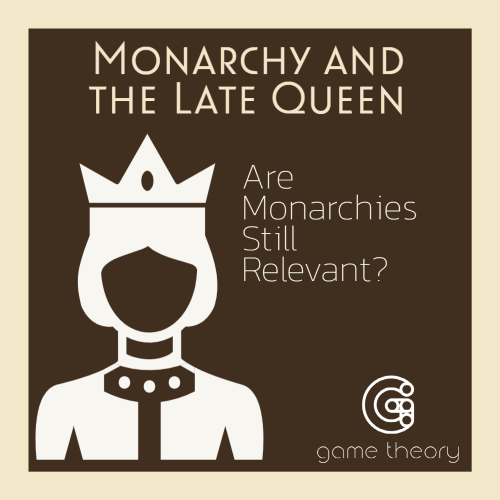In episode 40 of Game Theory, Nick and Chris reflect on the late Queen Elizabeth II and ask why Monarchies ever existed and, why they're still a thing.

Listen to episode 31 wherever podcasts are found.
Elizabeth Windsor became the Queen of England in the 1950s, where she reined as the sovereign until her death in September of 2022.
For decades, Queen Elizabeth II served as the United Kingdom's "sovereign" which means something like: the most important citizen. In this role, the monarch (now King Charles III), simply acts as an impartial and steady citizen -- a moral compass for the entire Kingdom.
Kings and queens no longer command armies, set policy, or really do anything other than represent what it means to be British (sort of).
It should be noted that not all people are sad Elizabeth Windsor passed. Scottland, part of the UK, has long feuded with England and (kind of) Wales. In general, Scots are somewhere between apathetic and celebratory that the queen is dead.
Taking it a step further, Irish and people of Irish descent are celebrating her death and mocking the English grief and the (fake-feeling) grief of the world. Indeed, at most Irish bars/pubs, you can order a drink called a "Lizzy in a Box." and Irish soccer fans chanted that refrain, "Lizzy's in a Box" in a recent match in Dublin.
But with her passing, the world is fascinated and emotional about the passing of the crown to her son Charles. This prompts the question:
What is the point of this?
But, what does the sovereign do? For those of us who watch The Crown on Netflix, we know that she basically doesn't do anything, but that she also does everything. The best way that I can think about it is that the sovereign is basically what England (not the UK) would be if it were a person.

The King/Queen is an ideological symbol to whom the populous can look for inspiration or moral center when things are difficult or when celebration is called for. That means the most important thing to do is nothing.
But, to actively do nothing is quite different than passively not doing anything. Process that again. Doing nothing is harder than not doing anything. That latter is to be lazy, apathetic, heartless, lifeless, and decayed. But, to do nothing is to be patient, courageous, wise, and calculating.
The point is made early in The Crown when newly coronated Elizabeth hears from her ailing grandmother, Queen Mary who, herself, had been in the Royal Family since 1893 when she married Prince George Duke of York.
In the scene, Mary makes it clear exactly what Elizabeth's job is and acknowledges exactly how hard it's going to be.
From The Crown E1.4
Elizabeth
It doesn't feel right, as head of state, to do nothing.
Queen Mother
It is exactly right.
Elizabeth
Is it? But surely, doing nothing is no job at all.
Queen Mother
To do nothing is the hardest job of all. And it will take every ounce of energy that you have. To be impartial is not natural, not human. People will always want you to smile or agree or frown and the minute you do, you will have declared a position -- or point of view. And that is the one thing as sovereign that you are not entitled to do. The less you do, the less you say or agree or smile ...
Elizabeth
... or think or feel or breathe or exist ...
Queen Mother
... the better.
Still, it seems incredibly pointless for a major and important country -- with a parliament and prime minister -- to allow such frivolity at the expense of its taxpayers. Notably, Charles III does not owe the British government taxes on his newly inherited $700 million fortune. None. Not a cent.
So, even though he will not be making any relevant decisions about anything at all, he will also be above the law in ways that the average citizen could never hope to be. But, we know that kings and queens used to be the head of the state, the head of the military, and the policy standard for an entire country.
We know now that monarchies aren't fair and are not the best way to run a country. However, at one point they were. here's why:
The Game Theory of Monarchy - Hobbes and Rousseau
In game theory, a concept called the state of nature, suggests that without some agreed-upon sense of order, the bigger, stronger, smarter, and meaner humans will be the ones to survive. Essentially, without the threat of violence and/or punishment, humanity would descend into anarchy.
So, at some point, (probably around the agricultural revolution) humans decided to consolidate power with one entity -- a monarch. That monarch would be responsible for policing the community and protecting it from other outside forces.
By one person holding the weapons, theoretically, people would be safe from one another. One major issue with this form of government, you might imagine, is that the people can't choose the most worthy. Usually, it went to the firstborn son, though not always.
But, with the combination of the Greek/Roman republics with the idea of an executive branch for military structure, the usefulness of that consolidation of power waned and is now gone.
Since then, monarchs have been but moral symbols for their people and their governments. It sounds like it sucks, to be honest. But, It's not bad for $1 billion.







Comments